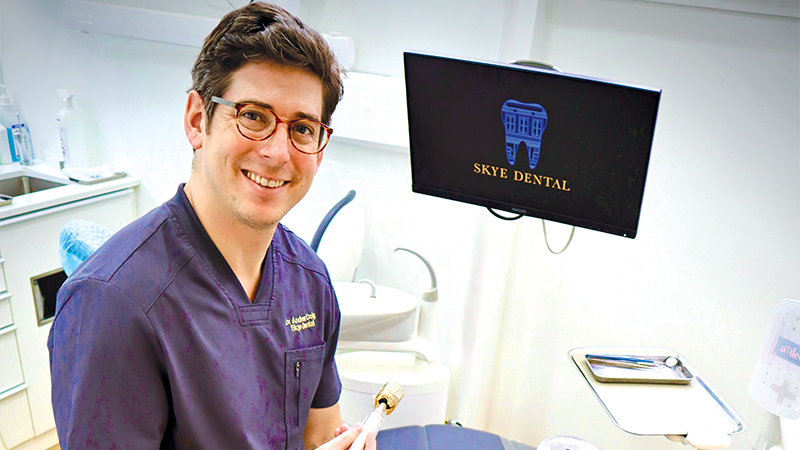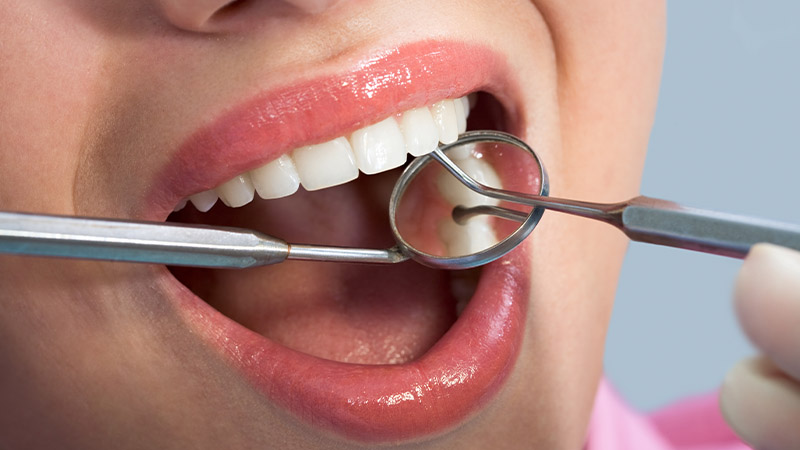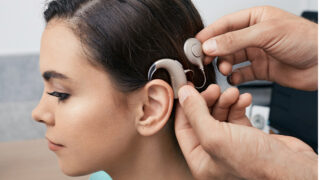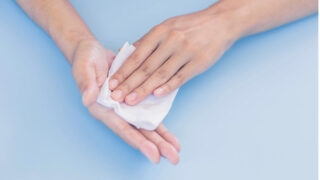Make way, Invisalign (though, we do love you!), there are some trending treatments to get on your radar! From 3D-printed appliances for teeth grinding to scalpel-free gum surgery to new teeth scaling technology, here’s a look at the latest in dentistry – and how your teeth can benefit from the most modern advancements at dental clinics in Singapore. So, if you’re looking for teeth whitening treatment, teeth polishing solutions, non-toxic ceramic fillings or techniques to stop teeth grinding, see what these Singapore dentists can offer!
A game changer in teeth scaling and polishing
Biofilm is a sticky, colourless coating that covers your teeth. It’s full of bad bacteria that cause gum disease and decay, explains dentist DR ANDREW DOIG of Skye Dental Clinic in Singapore. Plaque is one type of biofilm that builds up in your mouth every day from food and bacteria.
While it’s completely normal for plaque to form, it must be removed daily with flossing and brushing. If it’s not removed effectively every day, the layer of bacteria builds up and hardens into tartar (dental calculus). This tartar makes it difficult to brush and floss effectively, thus increasing one’s risk of tooth decay and gum disease. And, once tartar has formed, it can’t be removed at home. It can only be removed by a dental professional using special tools for teeth scaling.

About GBT
These tools have traditionally included manual scraping instruments, rubber cups and brushes, and abrasive pastes that have made for many less-than-comfortable experiences. Luckily, there is a more modern approach that cleans biofilm away, and takes the risk of dental decay and gum disease with it – minus the discomfort.
Called Guided Biofilm Therapy (GBT), the technique uses Airflow technology, heated water and a specially designed powder to remove biofilm even in hard- to-reach places, and clean and polish the teeth at the same time.
Though this Swiss technology was developed more than five years ago, it has not really been practised in Singapore until recently, says Dr Andrew. Singapore dentists must be trained and certified as official providers of Guided Biofilm Therapy in order to perform the technique.
Skye Dental is among the few dental clinics in Singapore that currently use GBT – and Dr Andrew says that the teeth scaling technology has been a total game changer in his dental clinic.
“GBT may sound like the name of a Korean pop group that your teen is into, but it’s the new scale and polish,” he says. “It is more effective for the removal of bacteria, hard tartar and stains than traditional methods because it uses a special dye to show all the ‘bad stuff’; there’s no hiding if it’s not cleaned off.”
A treatment with added benefits
There are other advantages of GBT, too. “It’s noninvasive and painless, and causes less sensitivity than the traditional teeth scaling methods. It uses a dedicated water supply that’s heated to 40 degrees Celsius; so, no more cold water on sensitive teeth!” says Dr Andrew.
“It’s also safer and scientifically proven not to damage your enamel, like the old-fashioned, abrasive polishing pastes, rubber cups and uncomfortable scratchy instruments do.”
What’s more, the teeth scaling and polishing procedure is gentle enough for anyone, including kids. “I find Guided Biofilm Therapy particularly good for children and those with braces or Invisalign, as it helps identify brushing shortcomings and gives us an opportunity to improve them. The bonus is that it’s completely painless,” says Dr Andrew. “In fact, patients have said that it’s more like a spa experience than a cleaning!”
Dr Andrew routinely uses GBT for all of his patients, including those undergoing orthodontic treatment by his wife, Dr Eide. The entire process takes around 30 to 60 minutes, and can work perfectly as part of a routine dental cleaning every six months.
Skye Dental
38 Club Street | 6980 5751 | skyedental.sg
Dental implants to fill in the gaps
If you’ve got one or more missing teeth, you’ll likely find dental implants to be a life-changing solution. Not only can they restore your smile, but also the function, explain Singapore dentists DR SHAWN GOH and DR ERIC LYE KOK WENG, specialists in oral and maxillofacial surgery. In fact, implants can dramatically improve an individual’s biting function, allowing for easier chewing and an improving eating experience altogether.
Replacing missing teeth with implants can also help improve speech and even reduce lisping that occurs due to air leakage from the missing teeth, says Dr Shawn. This, in turn, allows you to speak with more confidence, and have a positive impact on your career, social life and everything in between.

Why choose dental implants over bridges or dentures?
While conventional alternatives such as dentures and bridges can certainly help restore the look and function of missing teeth, dental implants have become the universal standard treatment for tooth replacement for many reasons, explains Dr Shawn.
Unlike removable bridges and dentures, dental implants are permanent structures that serve as anchors for artificial teeth (crowns) – no need to remove them for cleaning!
“They are surgically embedded into the jawbone to simulate the missing teeth’s roots. This forms a stable foundation on which crowns are placed to mimic the natural look and function of teeth,” says Dr Eric.
And, because they are firmly anchored in place, they tend to feel more natural than other tooth replacement solutions, he says.
What’s more, unlike bridges, implants do not require the trimming down of adjacent teeth to support the replaced teeth, according to Dr Eric. This means healthy teeth remain untouched, which can go a long way in maintaining strong teeth for years to come!
The Oral Maxillofacial Practice
#11-55/56 Mount Elizabeth Novena Specialist Centre, 38 Irrawaddy Road
6737 1649 | omfp.com.sg
Teeth whitening and brightening
Transforming darkened or yellowish teeth with whitening treatments can go a long way in increasing your confidence. One of the most popular laser whitening treatments at dental clinics in Singapore today is Zoom teeth whitening – no, nothing to do with videoconferencing, but rather an in-office treatment that involves applying specialised whitening gel to the teeth and using a special LED light to activate it.
According to Singapore dentist DR BRENDAN GIN of Smilefocus, the Zoom technology produces fast results. In fact, it has been proven to lighten teeth up to eight shades whiter in just one visit, he says. “The entire process takes just two hours, and leaves patients with whiter, brighter smiles.”
What’s more, Dr Gin says light-activated teeth whitening is completely safe and painless, and the benefits can be seen for years. Of course, you’ll need to do your part with proper upkeep – for example, avoiding teeth-staining foods and drinks for the first 24 hours after treatment.

The at-home treatment option
You can also brighten your smile with professional grade whitening gel in the comfort of your own home. At Smilefocus dental clinic, it starts with a visit to the Orchard-based clinic for an oral assessment and mouth impressions. Within days, you’ll have custom-made tooth whitening trays (similar to a mouthguard) to be worn at night until your desired results are achieved.
Whereas the in-office method has the advantage of being faster, the take-home whitening kit has the advantage of flexibility, says Dr Gin.
“Not only can you choose the strength of the solution with which you’re comfortable, but you can also choose how often to wear the tray – every night or every second night, for instance – until the desired result is achieved.”
And, though it’s the slower of the two methods, home whitening tends to produce more predictable results because of the amount of time the peroxide gel is in contact with the teeth, explains Dr Gin. For this reason, many of his patients prefer using the gel trays, and have seen improved colour in just a few days.
Regardless of the whitening method you go with, the best place to start is a consult, he says. An appointment at this dental clinic in Singapore can help identify the cause of discolouration and determine the most appropriate treatment option for you.
Smilefocus
#08-02/03 and #08-07/08 Camden Medical Centre, 1 Orchard Boulevard
6733 9882 | smilefocus.com.sg
Swap silver for ceramic fillings
If you’ve got old-school amalgam fillings, or “silver fillings”, you might want to consider replacing them with tooth-coloured ones for a more natural look. Dental surgeon DR THEAN TSIN PIAO of Aesthete Smilestudio recommends choosing composite or stronger ceramic fillings. Both are tooth-coloured, which means they can be closely matched to the shade of existing teeth. This creates a more aesthetically pleasing appearance than the silver metal look.
In terms of sturdiness, resin composite fillings, he says, are just as durable as the metal counterparts. Plus, they do not expand or contract to changes in temperature like amalgam fillings can.

More reason to go metal-free
Aesthetics aside, it’s advisable that amalgam fillings be replaced for health reasons, too, says Dr Thean.
Amalgam fillings are made up of 50 percent mercury and a mix of other metals. The mercury in these fillings has been shown to be harmful to both the human body and the environment. “The mercury from amalgam fillings gets released over time, emitting a vapour that’s inhaled and absorbed into the bloodstream. This is thought to have damaging effects on the organs, particularly the brain, kidney, liver, lungs and gastrointestinal tract,” he says.
For this reason, groups such as the World Health Organisation, World Dental Federation and International Academy of Oral Medicine and Toxicology (IAOMT) defend the decision to phase out amalgam use in accordance with the Minamata Convention on Mercury – a global agreement that aims to reduce the negative impact of mercury on the environment and human health.
As a member of the IAOMT, Aesthete Smilestudio has been supporting amalgam-free treatment for 20 years now. In fact, Dr Thean says that many of the dental clinic’s patients who became aware of the possible health risks have chosen to come in and get their existing amalgam fillings removed and replaced immediately.
“If you have existing amalgam fillings and want to remove them, do make sure to see a Singapore dentist who is able to do it safely.”
Aesthete Smilestudio
#03-01A Singapore Land Tower, 50 Raffles Place
6438 3811 | aesthetesmilestudio.com
Scalpel-free gum restoration
Gum recession is the gradual loss of gum tissue as a result of ageing, gum disease or teeth brushing too vigorously. Once the gums have pulled away from the tooth, the root is left exposed, making it more susceptible to decay, infection and even tooth loss. It can also cause tooth sensitivity, which makes eating hot and cold food, and even teeth cleanings, particularly unpleasant. Needless to say, receding gums are far more than just a cosmetic concern.
What’s more, once the gums start to recede, they will not reattach to the teeth and the condition will only get worse over time. To repair the damaging effects of gum recession, gum graft procedures are typically performed by a periodontist. This involves taking a flap of gum tissue from the roof of the patient’s mouth, and stitching it to the entire area surrounding the exposed root. While this technique has proven to produce effective results, it certainly doesn’t make for the most comfortable post-op experience; the patient usually has sutures both on the roof of the mouth and where the missing tissue was replaced.

Luckily, there’s now a minimally invasive procedure that’s designed to stabilise and, possibly, reverse the gum recession process and restore gum lines without incisions, grafts or sutures. Known as Pinhole Gum Rejuvenation, the scalpel-free technique utilises specially designed instruments to loosen the gum tissue, then guide it over the exposed root surfaces. Results are instant, and, since there’s no cutting or stitching, patients can expect minimal to no downtime.
However, there are only a select number of dentists and dental clinics in Singapore who have been certified to perform Pinhole Gum Rejuvenation. Among those dentists is DR JAMES HO of GPlus Dental Center at Camden Medical Centre. Dr Ho even trained directly under Dr John Chao, the inventor of the minimally invasive gum lift method.
He says that, in addition to minimal downtime and less discomfort after treatment, patients can expect the results to be long-lasting and have a natural appearance. Plus, the procedure is quick; it can be done in as little as two hours, which means you can do it during lunchtime at the dental clinic!
You can schedule a consultation with GPlus Dental Center to see if you’re a good candidate for Pinhole Gum Rejuvenation.
GPlus Dental Center
#02-01 Camden Medical Centre, 1 Orchard Boulevard
8339 0092 | gplusdental.com.sg
Zirconia crowns, made in the dental clinic
Dental crowns are an important type of dental restoration. Not only can they strengthen teeth that have been weakened due to caries or fractures, but they can also improve your smile by modifying tooth colour, position and size. Additionally, they can be attached to dental implants to replace missing teeth, acting as an alternative to bridges or removable dentures.
But, durable and natural-looking crowns require a degree of skill, both in the clinical and laboratory stages, explains DR STEVEN SOO, dental specialist in prosthodontics at Specialist Dental Group. Our dental clinic in Singapore offers a variety of different types of crowns, depending on the needs and preferences of the patient.

In the past, metal crowns – both precious metal (gold alloy) and non-precious metal – have been used as the industry standard. But, despite their durability, they fell short in the aesthetic department.
So, dentists began fusing porcelain to metal crowns to create a more natural appearance, anchored by the metal’s strength. However, porcelain’s propensity to chip or break easily makes the material less than ideal for back teeth, where the bite forces are stronger. What’s more, metal and porcelain crowns require a multi-step manufacturing process – one that’s dependent on the manual skills of a well-trained dental technician, explains Dr Soo.
These days, crowns made from zirconium have replaced metal and porcelain ones as the preferred choice. And for good reason.
Called monolithic zirconia crowns, they are entirely ceramic restorations, made with a totally different technique than their metal counterparts.
“The dental impression of the tooth is 3D laser scanned to provide a virtual tooth. Software tooth design is used to model the final crown to fit well with the adjacent and opposing teeth,” says Dr Soo.
“The use of computer-aided design (CAD) and computer aided manufacturing (CAM) results in a consistent product that is less dependent upon individual skill, while the use of monolithic zirconia ensures a strong, homogenous material.”
In addition to its durability, he says zirconia is highly scratch resistant with excellent biocompatibility; in fact, plaque doesn’t even stick well to zirconia! The translucent, metal-free, more natural appearance of monolithic zirconia crowns makes them suitable for capping even the most visible front teeth.
Specialist Dental Group
• #08-03/04/10 Mount Elizabeth Orchard, 3 Mount Elizabeth | 6734 9393
• #07-17 Gleneagles Medical Centre, 6 Napier Road | 6471 5150
specialistdentalgroup.com
3D-printed dental splints for teeth grinding
Over the last three years, teeth grinding – known as bruxism – has been on the rise, with Singapore dentists seeing an influx of patients with sensitive, cracked and chipped teeth since the start of the pandemic.
Teeth grinding can be treated using dental splints to reposition the jaw, thus reducing stress and pain in the temporomandibular joint (TMJ). These dental splints usually take up to one to two weeks to manufacture in a lab. And, with the rise in teeth grinding cases over the last few years, the turnaround times for such dental appliances have grown even longer, says the team at Expat Dental, a holistic dental clinic in Singapore for the entire family. These three- to four-week turnaround times delay treatment for patients, putting them at risk of further damage to their teeth.

But, thanks to advancements in digital dentistry, it’s now possible for dental splints for bruxism treatment to be produced in-clinic at Expat Dental’s Raffles Place practice, using 3D printing technology. In fact, this dental clinic in Singapore is the first to use its in-house NextDent 5100 3D printer to manufacture splints made from NextDent Ortho Flex resin, which offers more flexibility than the bulkier resins traditionally used in dental splints for teeth grinding.
“In today’s age of digital dentistry, the NextDent Ortho Flex resin presents a new dawn for the future of dentistry, paving the way for 3D printing innovation, dental technologies and dental care industries,” says DR SHAUN THOMPSON, managing director at Expat Dental.
Not only can the convenience of 3D technology make the entire restorative dentistry process more streamlined for patients, but the material itself can also improve the whole treatment experience. Certified by Singapore’s Health Sciences Authority, the newly launched NextDent Ortho Flex resin offers a more comfortable experience, making it easier for patients to wear the appliance while sleeping. This, in turn, means better compliance when it comes to actually wearing it.
Expat Dental
• #08-15/16 Novena Medical Centre, 10 Sinaran Drive | 6397 6718
• #01-00 Malacca Centre, 20 Malacca Street | 6816 5732
expatdental.com
Informed treatments with digital dental photography
According to DR MATTHEW WONG of Elements Dental Clinic, an essential part of a patient’s journey is digital dental photographs. It’s a complimentary service by these Singapore dentists that’s used in communicating with patients about their dental health, enabling them to be informed and involved in the decision-making of their treatment.

Dental photographs achieve the following:
- Show the patient what work was done and what the final result looks like;
- Allow the dental clinic to review the work and document steps that were done should the patient have to relocate and transfer their care to another dentist in the future;
- Act as a tool for communication between the clinic and their patients, and between anyone in the dental team that will be involved with the care of the patients such as external dental and medical specialists, dental technicians and ceramists; and
- Provide clinical documentation of the external condition of teeth for medico-legal reasons.
Dr Wong adds that dental photography is entirely safe with no risk of radiation and can be viewed on a screen almost immediately after it is taken. The dentist uses the photos for clear explanation about areas of interest or concern. In smile makeovers, patients can analyse their current smile and simulate how their dream smile could look, all with dental photographs. In a routine dental filling, a closeup photo of the damaged tooth acts as a baseline record of the tooth’s condition. During treatment, photographs are taken to document every step and a final photo is taken once filling is completed.
The most valuable thing about dental photography is active monitoring of dental conditions such as wear and tear, cracks, decay or infection over a period of time. Photos taken annually and compared side by side can help patients to clearly compare their dental condition.
Elements Dental
895 Bukit Timah Road
6463 2830 | FB: @ElementsDentalSG, IG: @elementsdentalsg
This article on Singapore Dentists first appeared in the July 2023 edition of Expat Living. You can purchase the latest issue or subscribe, so you never miss a copy! Read on for more on medical health as well as health and wellness tips.





